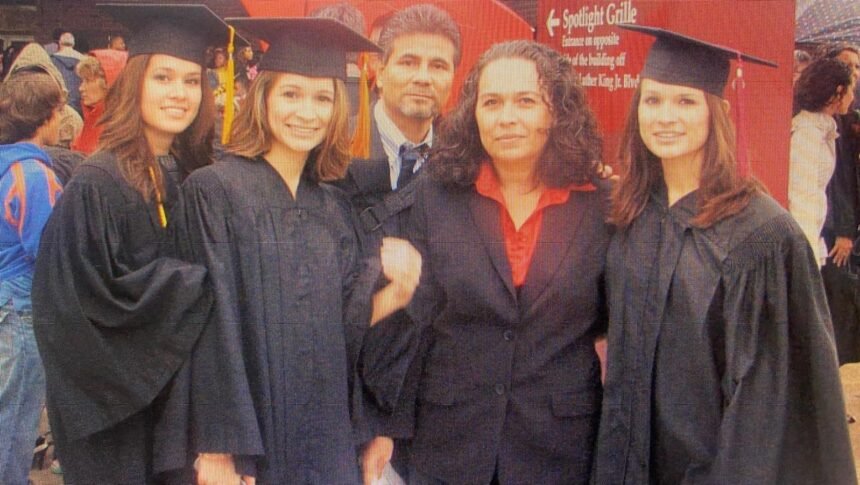In 1984, Daniel Maldonado escaped El Salvador and eventually found his way to Gadsden County, his new home.
“Leaving the country was the hardest decision I had to make, and I think one of the best at the same time,” said Maldonado, now a Tallahassee resident.
Throughout the 80s, approximately 75,000 people were killed in a civil war between the Salvadoran government and the Farabundo Martí National Liberation Front, a leftist movement that aimed to restructure the government to benefit the poor majority.
The Salvadoran armed forces were responsible for over 80% of those deaths, most of which were civilians, according to the United Nations.
Moving to the United States wasn’t easy, he said. He learned English. He went to night school and got his GED. Forty years later, he’s a project analyst with the state of Florida, and his three daughters all graduated from Florida State University.
Maldonado lives in Tallahassee now, and he said the area’s Latino community is totally different than what it was when he first arrived.
In 1985, there were no Latino grocery stores or shops. There were no services in Spanish, either. Most of the Latinos were migrant workers who worked on the tomato farms and came and went with the season. Very few stayed in Quincy.
Those who did included Maldonado and his brother, who worked for Quincy Farms, a mushroom farm that closed in 2009.
Today, the local community of working class Latino immigrants is growing. From 1990 to 2022, the number of Hispanic and Latino persons in Leon County has almost tripled, from 2.5% to 7.3%.
In Gadsden County, the Hispanic and Latino community grew the most between 1990 and 2022, increasing 9.3 percentage points to 11.7%.
“I think the United States has been awesome for me. Whatever I look for, I have worked for and I have achieved,” Maldonado said.
Latino small business community is growing in the Florida Panhandle
Driving down Tennessee street, once past Capital Circle Southwest, there are signs that Tallahassee has an established Latino community. First there’s Taqueria Miranda on the left, then Chile & Chilis’ on the right. If you continue to the intersection with Aenon Church Road, there’s La Escondida.
It’s a family-owned convenience store that’s been open for 12 years.
Kevin Magana, who works the register, said his grandfather came to Quincy in the 90s, and his parents followed suit.
At first, his parents worked in agriculture. Then his mother started making food and selling it house to house, job site to job site.

“I remember when she first started, others would tell her that she couldn’t do what she was doing, or they would call immigration on her, the police on her,” said Magana, who commutes in from Quincy to Tallahassee.
But “the American dream is still possible,” he added. Selling food allowed his parents to buy the convenience store, which has become an indispensable venue for workers to cash their checks and send money back to their families.
“A lot of people say the economy this, the economy that, but I think if you put your mind to it, anything’s possible,” Magana said.
Twenty years ago, Mexicans made up the biggest group of Latinos in the Florida Panhandle, said David Triana, the owner of Conexion Media Group.
Now, Central American Latino immigrants are the majority in Northwest Florida, from countries like Honduras, El Salvador and Guatemala, unlike Florida as a whole, where Cubans make up most of the demographic.

The majority of the Latino immigrant population in the area doesn’t just work in construction and agriculture anymore, Triana said. There’s been growth in the small business sector, especially in cleaning services and medical support staff.
There’s also been a bump in the number of Latino and Tex-Mex restaurants, said Nora and Sid Getz, the owners of La Tiendita restaurants since 2017.
When they first move to Tallahassee in 2013, “you didn’t hear Spanish,” Sid said, noting that now you’ll hear Latino voices in the aisles of Publix.
“The Hispanic community is more than just a few workers,” said Triana, who is Mexican. “There are all stripes and colors and careers.”
Most recently, both Triana and Magana have seen an increase in immigrants from Venezuela as the country suffers a “repression and a humanitarian crisis,” according to Human Rights Watch.
Almost 8 million people have fled Venezuela, as approximately 82% of the country lives in poverty and 53% live in extreme poverty, according to a UN expert.
“They like it here because it reminds them of home, the farms, the trees,” Magana said.
“I think it’s calm, I think it’s nice. It’s like a rural, city-type vibe, and I think that’s what a lot of people like,” he added.
A chance to get to know the Latino community in the Panhandle
When Maldonado first moved to Quincy, he and his wife started a small group of five or six families within the local Catholic church and began to gather in their own homes.
“When you’re in a different country with different people, you don’t know anybody, you remember your roots, your faith more, and that’s what I was looking for,” Maldonado said.
That small community grew, and now, almost 40 years later, St. Thomas the Apostle Catholic Church, now has mass in Spanish every day.
On Dec. 8 between 10 a.m. and 10 p.m., the church will celebrate Our Lady of Guadalupe with a festival that will include music, food, dancing, games for kids, soccer, prizes and more. All are welcome to enjoy the celebration at the church at 27 N. Shadow Street in Quincy.
It’s a good opportunity to get to know the area’s Latino community, Maldonado said.
“By not knowing other people, sometimes you presume things,” he said.
“Get to know the people, see their values, their good hearts,” he added. “They’re hard working. They have all the good things that people have to offer.”
Arianna Otero contributed to this report. This story is part of TLH 200: the Gerald Ensley Bicentennial Memorial Project. Throughout our city’s 200th birthday, we’ll be drawing on the Tallahassee Democrat columnist and historian’s research as we re-examine Tallahassee history. Read more at tallahassee.com/tlh200. Ana Goñi-Lessan can be reached at agonilessan@gannett.com.











